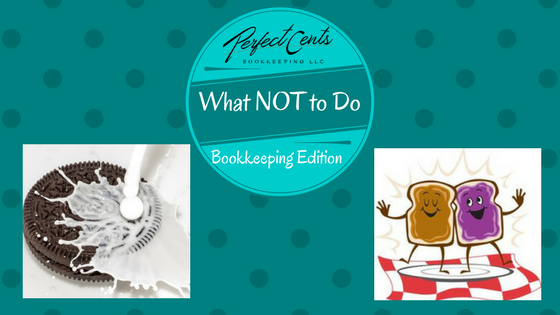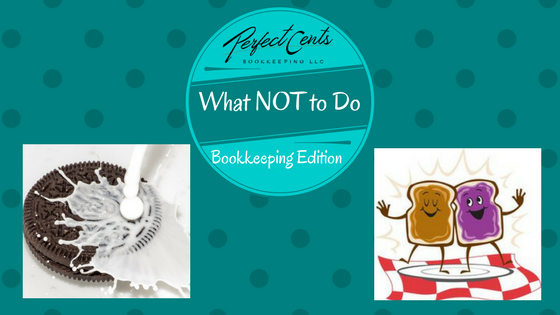There are lots of things that go together such as peanut butter and jelly, turkey and stuffing, or cookies and milk. Today, we're going to discuss personal funds and business funds. Unlike the first three examples, these two are NOT things that go together.
Whether you have been in business for years or just started yesterday, you could be a part of the 26% of businesses that do not separate their business from personal funds. Ahh! This might look like using a single debit/credit card and account for both business and personal transactions, writing checks from one account for both business and personal expenses or even just having business and personal money sharing one account. If it happens occasionally, then no big deal, but if this is a regular practice for you, then you need to think about a different plan.
Personal and Business Funds should not overlap, nor be kept within one or the other.
No matter what way this may look, it is not a good idea for many reasons.
1. The big one is that if you were to be audited by the IRS, you would have to prove which expenses were business-related and which were personal. If you have them mixed together, your job of proving becomes a LOT more difficult.
2. If you have your money separated, this helps you run your business more efficiently because there is a clear boundary. Wouldn’t it be scary to be unsure of whether your business is in the red or not? Wouldn’t you hate to find out after the fact that you spent your family’s mortgage money on the business?
3. Yet another reason is when tax time comes, you decrease your liability and make it much easier to deduct your business expenses if you have your accounts separate. If you are trying to deduct expenses from your business and your accounts aren't separate, this can be a large "RED FLAG" to the IRS that your business is actually a hobby.
“If you’re running a business (no matter how many transactions or how much revenue), treat it like the business it is. Separate your personal from business funds.”
Overall, it makes it so easier on yourself, your financial advisors, and your tax savings if you keep business with business; personal with personal.
If you have been mixing your money, PLEASE, take my advice today. There are many ways to find free or very inexpensive checking and savings accounts for both personal and business that each has their own debit or credit card associated with that account. If you haven’t already, open a separate business account that all of your business expenses and revenue will run through from this point forward. This will save you time from having to classify expenses between personal and business later on, giving you clear, organized records overall, and peace of mind should you ever be audited.
Best practice is to keep Personal Funds completely separate from Business Funds.
If you need to find somewhere that offers a free business checking account, here is an article from NerdWallet from September 21, 2016 called "Find a Free Business Checking Account". It goes through banks in most states and on-line, giving you plenty of options! Also, you may want to check with your current bank that you use to see their requirements. ALWAYS make sure to read all the fine print as many free accounts have fees for certain transactions or overdrafts, and/or requirements to keep the account free like keeping a certain amount of money in at all times, or having so many debit/credit transactions. Just be aware before you sign up.
Is this you? Do you need to separate your personal and business funds? It is not too late!
You can always contact Perfect Cents Bookkeeping LLC today if you need help getting your books in order.




